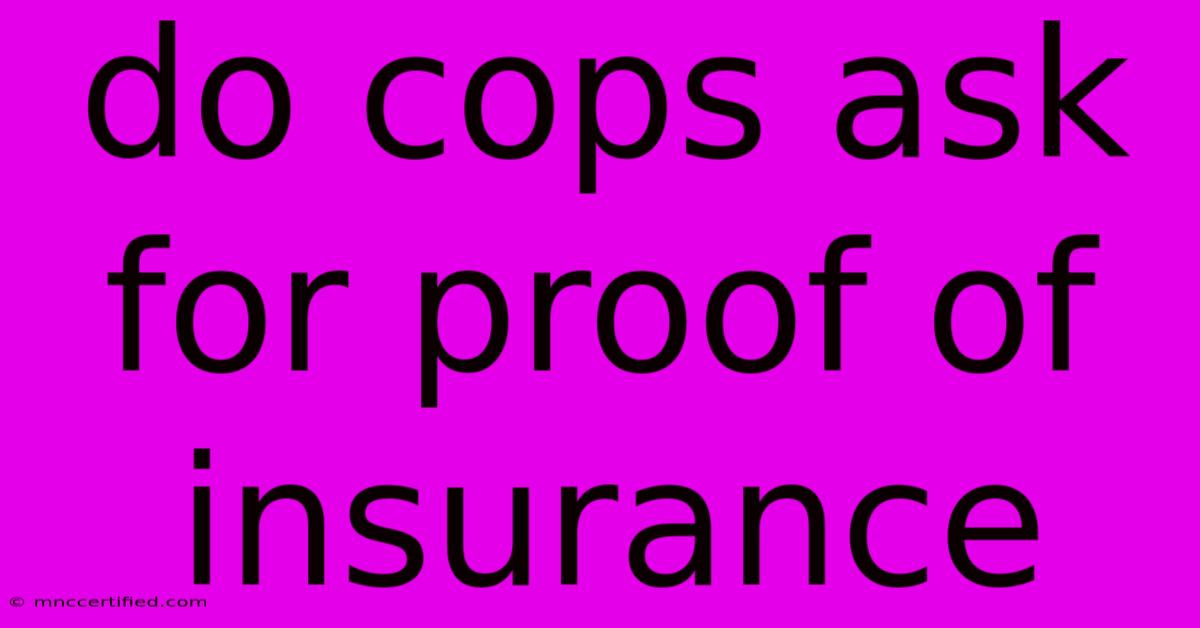Do Cops Ask For Proof Of Insurance

Table of Contents
Do Cops Ask for Proof of Insurance? A Comprehensive Guide
Getting pulled over is never a pleasant experience, but knowing your rights and responsibilities can ease the tension. One common question drivers have is: do cops ask for proof of insurance? The short answer is: yes, in most places, police officers are authorized to request proof of insurance. This article will delve into the specifics, helping you understand when you might be asked, what constitutes acceptable proof, and what happens if you can't provide it.
When Police Officers May Ask for Proof of Insurance
The circumstances under which a police officer might ask for proof of insurance vary, but here are some common scenarios:
- During a routine traffic stop: This is the most frequent reason. Officers often run license and registration checks, and insurance verification is typically part of this process. Even a minor infraction, like a broken taillight, could lead to an insurance check.
- After an accident: If you're involved in a car accident, regardless of fault, officers will almost certainly request proof of insurance from all involved drivers. This is crucial for determining liability and facilitating the claims process.
- During a suspicion-based stop: If an officer suspects you are driving without insurance, they have the authority to request proof. This might stem from erratic driving, a damaged vehicle, or other observable factors.
- During a vehicle inspection: Depending on your location and the type of inspection, officers might check your insurance documentation.
What Constitutes Acceptable Proof of Insurance?
The acceptable forms of proof of insurance vary slightly by state and jurisdiction, but generally include:
- Insurance card: This is the most common and convenient form of proof. Keep your insurance card in your vehicle, readily accessible. Make sure your information is current and accurate.
- Digital insurance card: Many insurance companies now offer digital proof of insurance via their mobile apps. Ensure your phone is charged and accessible. However, it is wise to have a physical copy as a backup.
- Printed insurance policy: While less convenient, a printed copy of your insurance policy serves as valid proof.
Important Note: A verbal confirmation from your insurance company is generally not sufficient. You need physical or digital documentation.
What Happens If You Can't Provide Proof of Insurance?
The consequences of not having proof of insurance can be severe and vary by location. They typically include:
- Fines: You will likely face hefty fines for driving without proof of insurance, even if you actually do have insurance.
- Suspension of your driver's license: Repeated offenses or a failure to provide proof can lead to license suspension.
- Vehicle impoundment: In some cases, your vehicle might be impounded until proof of insurance is provided.
- Court appearance: You might be required to attend court to resolve the issue.
- Increased insurance premiums: Even after resolving the initial issue, your insurance premiums may increase significantly in the future.
Proactive Steps to Avoid Problems
The best way to avoid problems with the police is to always carry proof of insurance. Here are some proactive steps:
- Keep your insurance card up-to-date: Regularly check your insurance card to ensure the information is accurate and current.
- Store it in an easily accessible location: Keep your card in your glove compartment or a readily accessible location in your vehicle.
- Consider a digital copy: Download your insurance card to your phone app for a backup.
- Inform your insurance company of any changes: Notify your insurance company of any address changes or vehicle changes immediately.
Conclusion
To summarize, police officers do ask for proof of insurance, and it's crucial to be prepared. Carrying your insurance card and understanding the consequences of not having it can prevent significant inconvenience and financial penalties. Always prioritize safe driving practices and maintain valid auto insurance. Knowing your rights and responsibilities as a driver is paramount to a smooth and legal driving experience.

Thank you for visiting our website wich cover about Do Cops Ask For Proof Of Insurance. We hope the information provided has been useful to you. Feel free to contact us if you have any questions or need further assistance. See you next time and dont miss to bookmark.
Featured Posts
-
Watch Ohio State Vs Northwestern Free 11 16
Nov 17, 2024
-
Insurance Adjuster License Alabama
Nov 17, 2024
-
Johnsons Five For Australia Wins Series
Nov 17, 2024
-
Ufc 309 Jones Vs Miocic Results
Nov 17, 2024
-
Australia Beats Pakistan By 13 Runs
Nov 17, 2024